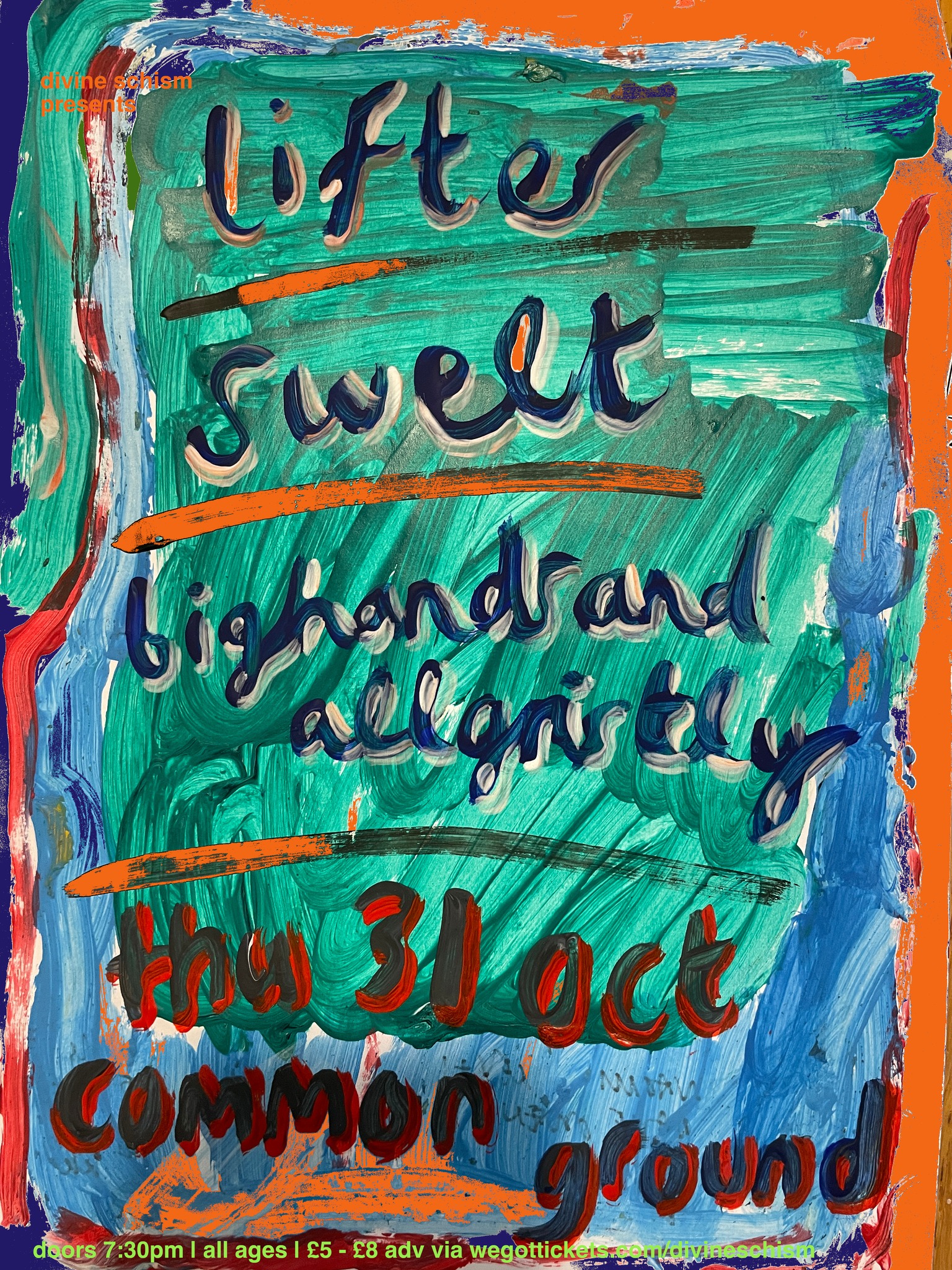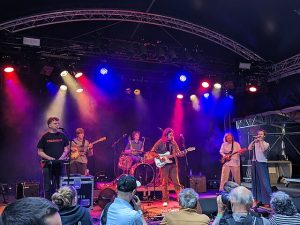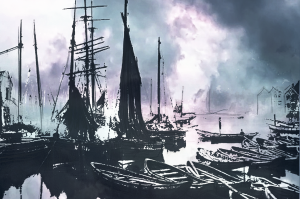Icon of the Week: Bighandsandallgristly
by Joseph Rodgers | October 28, 2024

It’s never entirely clear whether the members of Bighandsandallgristly are giving a straight answer. Comprised of Helena Emmett (violin, mostly), Cordelia Wilson (keys, mainly), and Ben Scott-Warren (guitar, generally), it’s at least apprehensible that this is a new-ish three-piece band out of Wadham College. Having played their first gig last Trinity at Wadstock, they’ve been recording demos and performing in London over the summer, and now they’re ready to make their Oxford comeback, just in time for Halloween.
I meet them in the Fir Tree. There’s a guess-the-pop-song pub quiz going full-swing inside, but they’re sitting in what just about qualifies as a back garden, playing their newly invented game: ‘What’s the grossest noise you can make?’ The point, it seems, is to make a noise strange enough to be worthy of the game, but not quite enough to be actually gross. When we get onto the music, the first challenge is working out how to categorise what kind they make. They’ve been billed variously, from ‘neo-folky’ with ‘a strong classical element’ all the way through to ‘off-kilter lo-fi art rock’, but they are intent on not limiting themselves by definitions. ‘In some sense,’ Ben says, ‘Bighandsandallgristly is an acknowledgement of the individual, creative mind as an objective force to be thematised and centred, and it says you should tap into your own process, rather than baiting yourself with other things.’ Later, we’re returning to definitions, but again they won’t be drawn. In the end I’m told they’re ‘body-horror punk’. They certainly aren’t, but that, obviously, is the point.
On other topics, though, they offer the story in full. The name, they tell me, began as ‘Hansel and Griddy’. By the time they got to Wadstock, they’d grown to ‘Hansel and Griddy and Lil Diddy’, with the addition meant to sound a bit like ‘and a little ditty’, in order to fit Wadstock’s medieval theme. But the subsequent arrest of P. Diddy necessitated further changes, so now we have ‘Bighandsandallgristly’. This version pays homage to Michael Rosen’s version of the Grimm Brothers’ fairytale. The Wadham alum’s ‘Handsel and Gristle’ is similarly fond of pseudo-explanation: ‘The one was called Handsel, because he had huge hands. And the other was called Gristle, because it was all gristly.’ The band wanted me to make clear, though, that they associate with Rosen in a ‘pre-Wadham way, not a post-Wadham way.’
All three members contribute to the vocals, and the exact division of labour is still up for discussion. When I refer to Ben as the lead singer, Helena quickly asks: ‘But is he the lead singer anyway?’ Cordelia explains: ‘Someone is usurping him.’ That someone is, in fact, her. Among the songs being considered for this switch in vocals is “Zine Launch”. Underneath lyrics about taking the train from Cambridge to Canterbury, the song journeys from a section of wistful, flowing violin to a build-up led by a rapidly strummed acoustic guitar, almost evoking flamenco. Perhaps the most memorable moment comes in the later section, when Ben (for now, at least) sings in a tone more surely sincere than anything he uses to talk about the band: ‘Canterbury West / Never has toilets.’ The song returns more than once to a rhythmically deceptive anacrusis, during which their precision testifies to the band’s shared musical understanding.
In their next show they’ll be debuting their new song, “Swimming Pools” (yes, a reference to the Kendrick Lamar song). They’re enthusiastic about the new number, and they think it’s their most adventurous to date. ‘It hinges on one central conceptual interestingness,’ Ben explains, ‘which is that every phrase feels like it should be the hook of a folky song with lots of repeated phrases, but nothing ever repeats. There’ll be, like, a four-chord sequence that you expect to repeat, but it never does.’ But, true to form, they don’t stay earnest for long. Cordelia adds: ‘It reminds me of Marnie and Desi’s band in Girls. They’re always singing shit like that.’
Now on the topic of influences, I ask if the band can sum up their sound that way. Cordelia cites Prefab Sprout, while Ben offers up Sun Kil Moon. For Helena, whose previous musical projects have all been in classical settings, the big names—Shostakovich, Mozart—are key reference points. Classical influence isn’t limited to Helena, though: Cordelia says she’s a big fan the Russian composer Alexander Scriabin, while their song “John Download”, a name Ben penned, is a play on the name of English Renaissance lutenist John Dowland.
After Wadstock, alongside playing some low-key sets in college bars, the band focused on getting demos recorded. Once armed with four tracks straight out of Cordelia’s living room, they emailed most of the London pub-cum-venues they could think of, ready for the Long Vac. Their most notable scalp was a show at The Windmill Brixton, which not too long ago garnered a lot of attention as the centre of a wave of many-membered post-punk bands, most notably Black Midi and Black Country, New Road. They seem to want to play this down somewhat—‘It’s kind of an iconic venue but that doesn’t mean they don’t put on things every night, and not everything they put on is iconic’—but there’s no denying that the Windmill is a big deal for new music in the UK right now, if nothing else as a scene whose influence bands want to overcome in order to find originality. When I ask how it is making music as a drumless three-piece, I’m told: ‘we’ve kind of had it in mind that we want to work to some extent against a wave of extremely large bands.’ But this doesn’t negate that one of the few things the band is unambiguously enthusiastic about are the musicians they’ve been able to share a bill with. ‘Really, one of the things that we love,’ Ben says, ‘about playing live is that you get to discover new music every time from the people you’re supporting and playing with.’ They played a night called ‘Twangfest’ alongside Painted Bird, a side project from the lead singer of Opus Kink, and have ‘watched the three existing YouTube videos of Painted Bird many a time since.’
So, if that’s how Bighandsandallgristly felt about their summer, how do they feel coming back to Oxford? Cordelia begins obliquely: ‘It’s a great place to be in a cover band.’ Ben is more blunt: ‘Be in a college choir and make good music or be in a cover band and get a lot of free ball tickets, but either way don’t do anything original.’ In Oxford, Cordelia says, ‘a lot of people don’t have much taste because they’re too busy thinking about whether they have taste. But maybe I’m being mean.’ For Ben, this leads to a situation in which ‘people seem come to Oxford very interested in music but give up any aspirations for making music in a way that’s aware of music as some kind of art form.’ I’m inclined to agree with them. It’s striking how few student bands in Oxford play original music, especially when you compare it to the numbers of students who work creatively in drama, the visual arts, and writing. But that doesn’t mean being spared from criticism. ‘Even The Isis seems to only want cover bands.’ I asked if the band wanted to expand on this. They did: ‘Put this in. There’s this magazine called The Isis, and they just always want people to cover the same songs. And yet they all think they’re artsy fucking people. And they all also have very firmly as a cultural reference point London-ness. But if they were actually involved in London-ness they would want real bands.’
Finally, we turn to the band’s upcoming Thursday 31st October gig at Common Ground, which is part of the long running ‘Divine Schism’ series. They seem genuinely excited, with Cordelia referring to the series as ‘the last hope for Oxford, culturally.’ ‘If you’re interested in DIY music,’ Ben adds, ‘go to Divine Schism gigs. It’s crazy amounts of local music that’s actually really interesting. It does exemplify, kind of amazingly, how much you might expect that the intelligent, avant-garde of music in Oxford would come from, like, Oxford University, but it doesn’t, because there’s way more from just other people in Oxford.’ To finish, Cordelia tells me: ‘You should really give a shout out to the people who run Divine Schism, because they’re really nice. If you’re a person who does interesting things musically, you should just email them—otherwise, don’t. And I fucking love their posters.’ ∎

Words by Joseph Rodgers. Image courtesy of Bighandsandallgristly.




